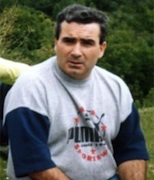
A woman who became embroiled in Britain’s ‘Dirty War’ has received High Court permission to bring an unprecedented legal action against Freddie Scappaticci, the reputed British double-agent known in the media as ‘Stakeknife’.
Margaret Keeley, whose ex-husband Peter Keeley was also a double-agent (the former MI5 informer known as Kevin Fulton) won her appeal last week against being denied the chance to sue Scappaticci.
A judge also ruled that the Newry woman can add the British Ministry of Defence as another co-defendant to her damages claim against the PSNI police chief, Matt Baggott.
Mrs Keeley was wrongfully arrested and falsely imprisoned during a three-day period in 1994 when she was held at Castlereagh interrogation centre. She believes her detention was part of an elaborate plot to protect her husband’s cover.
At the time Mrs Keeley was unaware of her husband’s own role as an informer, she said.
When he first told her about ten years ago she said she did not believe him at first.
Finally, around 2007, she took her case to the British Irish Rights Watch group on the advice of her now ex-husband.
“He told me he was a British agent and that I was lifted and shouldn’t have been; that it was a cover for him.”
Mrs Keeley was released without charge but claims to have then been taken with her husband to a flat in the New Lodge area of the city and questioned by an IRA security team.
She said Scappaticci, who is still denying allegations that he was a double-agent, was one of the men who carried out two IRA debriefing sessions.
Mrs Keeley says she only realised who he was when he was exposed by the media in 2003 as an alleged informer. She believes her entire ordeal may have been planned by two of Britain’s top double-agents, their handlers in MI5 and the Special Branch.
Justice McCloskey said the nature and weight of herclaims “give rise to acute public concern and interest”.
“The plaintiff’s allegations raise the spectre of a grave and profound assault on the rule of law and an affront to public conscience, as measured by right-thinking members of society generally,” hesaid.
The ruling could mean Scappaticci being called to a court for the first time since his disappearance from Ireland eight years ago.
Following the verdict, MrsKeeley’s lawyer, Kevin Winters, hailed the significance of the outcome.
“This application is withoutprecedent,” he said.
“It represents a huge step forward for Margaret Keeley inher battle to unravel what happened to her 17 years ago.
“It was very brave of her to come forward and give evidence in order to sustain her case but she did receive a very fair hearing from the court.
“I must stress, however, that we are still at a relatively early stage in the proceedings and she has a long way to go.”
![[Irish Republican News]](https://republican-news.org/graphics/title_gifs/rn.gif)
![[Irish Republican News]](https://republican-news.org/graphics/title_gifs/harp.gif)

